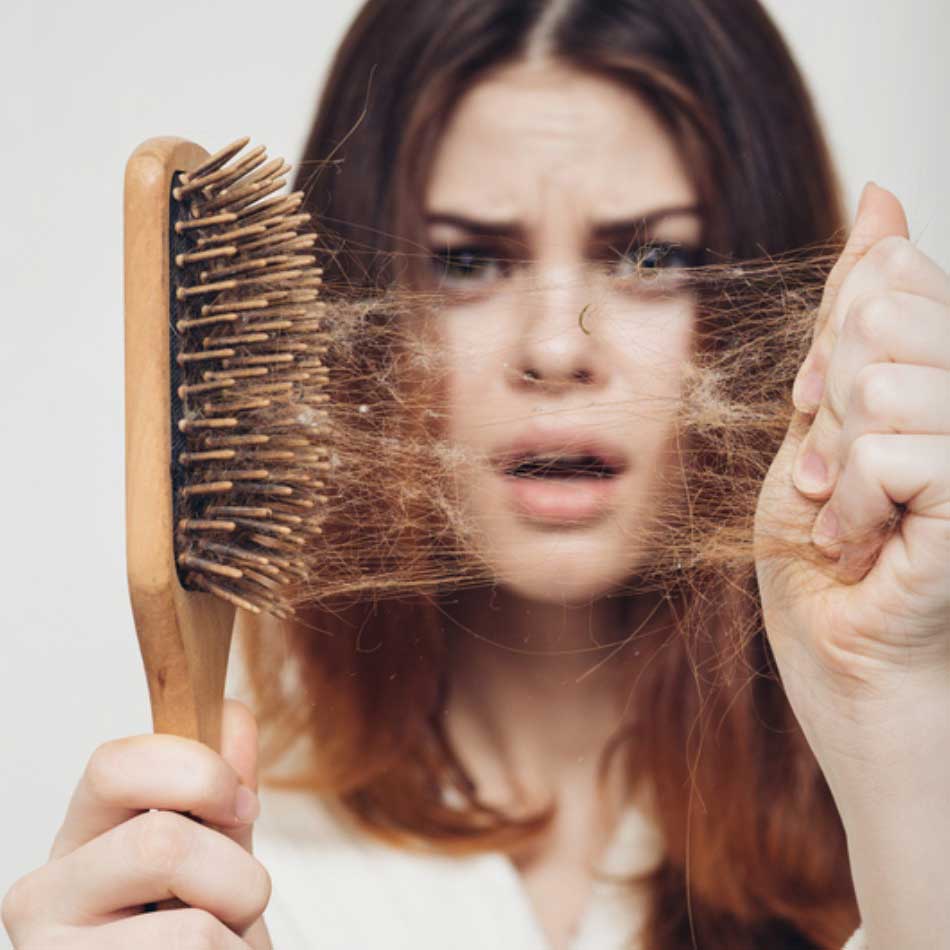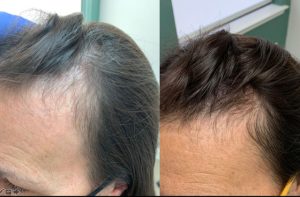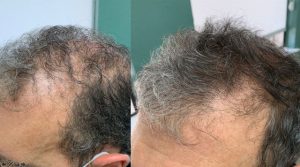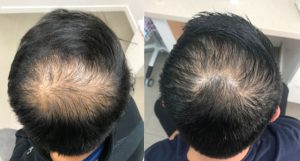PRP for Hair Loss
Conveniently located to serve the areas of Walnut Creek, CA

PRP, or Platelet-rich plasma, is a medical treatment that uses the regenerative components derived from the patient’s own blood to promote new and thicker hair growth. Also known as autologous platelet-rich plasma, the process involves drawing blood, extracting the platelet-rich plasma, and injecting it into the scalp. PRP contains growth factors that promote cell reproduction and tissue regeneration. As a result, it increases blood supply to the hair follicles, stimulates new hair growth and nourishes the scalp. PRP can also be used to treat other medical conditions and issues related to hair loss.
At Evolved Medical, Dr. Amit Rajguru, a board-certified internal medicine physician, is passionate about using natural methods to improve cellular health and promote a more energetic, healthy, and enjoyable life. He has completed a fellowship in Anti-Aging and Regenerative and Functional Medicine from the American Academy of Anti-Aging Medicine. He uses his expertise to help his patients achieve full, healthy heads of hair. How can thick, natural-looking hair improve your look and your life? Find out by calling (925) 433-8444 or filling out this form. Serving the areas of Walnut Creek, CA, and beyond!
Contents
- 1 Before and After Photos
- 2 What is Platelet-Rich Plasma?
- 3 More About Hair Loss
- 4 What are the Benefits of PRP for Hair Loss?
- 5 Am I a Candidate for PRP for Hair Loss Treatment?
- 6 Personal Consultation
- 7 Preparation
- 8 The PRP Procedure
- 9 Recovery After Treatment for Hair Loss
- 10 What are the Results of PRP for Hair Loss?
- 11 What is the Cost of PRP for Hair Loss in Walnut Creek, CA
- 12 FAQ
- 13 References
Before and After Photos
What is Platelet-Rich Plasma?
PRP, or Platelet-rich plasma, is a treatment option for individuals experiencing hair loss due to various causes such as aging, alopecia, or other factors. It is a natural, non-surgical, and minimally invasive procedure that can help to increase hair growth and minimize hair loss.
PRP is thought to work by promoting blood flow to the hair follicles, which can help to revitalize dormant hair follicles and promote new hair growth. It also helps to strengthen the existing hair fibers, reducing the hair fall rate.
PRP is a suitable treatment option for individuals experiencing hair loss caused by various factors we will expand on below. However, it’s important to note that PRP may only be effective for some. It’s always important to consult a medical professional like Dr. Rajguru to determine if PRP is a suitable treatment option.
More About Platelets
Platelets contain growth factors that promote healing and tissue regeneration. PRP has been used for many years to promote wound healing. Over the last decade, it has become a valuable tool in various medical specialties such as maxillofacial surgery, plastic surgery, orthopedics, and sports medicine.
PRP has recently been used for dermatologic purposes, specifically for treating male and female pattern hair loss. Studies have shown that when activated, platelets release signaling molecules that help existing cells survive, while also stimulating the production of new cells, promoting hair growth. [1]
More About Hair Loss
Why do some patients lose their hair and others have thick, healthy heads of hair well into later life? Many factors can contribute to hair loss, and the reasons can vary from person to person. Some common causes of hair loss include:
Genetics
Genetics plays a major role in hair loss. Certain genetic conditions, such as male-pattern baldness, female-pattern baldness, and alopecia areata, can make people more prone to hair loss.
Male-pattern baldness, also known as androgenic alopecia, is the most common cause of hair loss in men. Pattern baldness can also affect females, but hair loss occurs differently. Male-pattern baldness typically presents as a receding hairline, while female-pattern baldness is characterized by a gradual thinning of hair on the top and crown of the head while the hairline remains intact. The condition can also cause hair to become finer and affects the texture of hair. Both male- and female-pattern hair loss is caused by a sensitivity to dihydrotestosterone (DHT), which affects the health of hair follicles and shortens the growth cycle of hair. Because PRP contributes to the regeneration of vital cells in the scalp, PRP has been shown to be an effective solution. [1]
Hormonal Imbalance
Hormonal imbalances can play a significant role in hair loss, particularly in women. The hormonal changes that occur during pregnancy, menopause, and thyroid disorders can affect the growth and health of hair. Dr. Rajguru can perform a simple blood test to identify any hormonal imbalances, and offers bioidentical hormone replacement therapy for men and women, which can also help resolve hair loss.
Medical Conditions
Medical conditions such as lupus, diabetes, and anemia can cause hair loss.
Medications
Certain medications, including blood thinners, birth control pills, and antidepressants, can cause hair loss.
Stress
Stress, both physical and emotional, can cause hair loss as well.
Nutrient Deficiencies
Nutrient deficiencies, particularly those of iron, zinc, and vitamin D, can lead to hair loss.
Poor Hair Care Practices
Lastly, hair care practices such as frequent use of heat styling tools, tight hairstyles, and harsh chemical treatments can also lead to hair loss.
Hair loss can be a symptom of a larger underlying issue, and it is important to consult a medical professional like Dr. Rajguru if you are experiencing hair loss. He can help determine the cause and recommend the appropriate treatment.
What are the Benefits of PRP for Hair Loss?
PRP (Platelet-rich plasma) is:
- A non-surgical and minimally invasive treatment that can increase hair growth and strengthen hair follicles to prevent hair shedding
- A treatment with no downtime or recovery; any redness at the injection sites typically resolves within a few days of treatment.
- A way to achieve natural-looking results
- Performed by injecting components of the patient’s own blood into the scalp, so there is little risk of an allergic reaction or other adverse side effects.
- A long-lasting solution to improving hair growth and density.
PRP addresses the underlying cause of hair loss by stimulating inactive hair follicles and promoting new hair growth. Some medications that stop hair loss do not promote new growth as PRP can. Furthermore, by blocking the production of dihydrotestosterone (DHT), a hormone that contributes to hair loss, these medications can cause sexual side effects in some men, such as decreased libido and erectile dysfunction. Not so with PRP. In fact, PRP can be injected in the genitals of men and women to enhance sexual performance and sensation!
Hair transplant surgery is a procedure that involves taking hair from one area of the scalp and transplanting it to the area of hair loss. The procedure can cause bleeding, infection, and scarring; in some cases, the transplanted hair may not grow properly or be lost again.
It is important to schedule your consultation to weigh the potential benefits against the possible risks and side effects with a licensed professional—call (925) 433-8444 to schedule your appointment with Dr. Rajguru.
Am I a Candidate for PRP for Hair Loss Treatment?
PRP treatment is a suitable option for individuals experiencing hair loss due to various causes, such as aging, alopecia, or other factors, and wishing to boost hair growth and reduce hair loss. The ideal candidates for PRP treatment are those who have realistic expectations of the treatment outcome and are willing to commit to a series of treatments for optimal results.
PRP is not recommended for people with certain medical conditions, such as blood disorders, platelet disorders, and certain types of cancer. Additionally, if you have a history of keloid scars, you should discuss this with Dr. Rajguru before undergoing PRP treatment.
To maintain the results, PRP treatment should be used in conjunction with other hair loss treatments, such as hair care products and a healthy lifestyle. Schedule your consultation so Dr. Rajguru can determine your eligibility for this incredible new hair loss solution. Before long, you will enjoy a thicker, healthier head of hair naturally.
Personal Consultation
A consultation for PRP (Platelet-rich plasma) treatment for hair loss involves a thorough evaluation of the patient’s medical history, current hair loss condition, and treatment goals. Dr. Rajguru will ask questions about the patients:
- Overall health
- Previous hair loss treatments
- Medications or supplements they are currently taking.
Dr. Rajguru will perform a physical examination of the scalp, including a visual assessment of the hair density and pattern of hair loss. He will take photographs of the scalp for documentation and comparison purposes.
Dr. Rajguru will then explain the PRP treatment process, including what to expect during and after the procedure and the potential risks and benefits of the treatment. Finally, he will discuss the expected outcomes of the treatment and the number of sessions required for optimal results.
The patient will also have the opportunity to ask questions about the procedure. Our team will provide answers and additional information to help the patient make an informed decision about the treatment. After the consultation appointment, the patient will have all the necessary information to decide if PRP is the best action. We can schedule the appointment right then—call (925) 433-8444 to get started.
Preparation
Patients should avoid hair treatments, such as coloring, perming, or relaxing, at least a week before the appointment. Remember that blood tests may be required before the appointment, but we will let you know if you need to do any before the treatment.
The PRP Procedure
PRP treatment for hair loss is a short, minimally invasive procedure that does not usually cause side effects. Before the procedure, Dr. Rajguru will numb the scalp with a local anesthetic if the patient wishes. A small amount of blood is drawn from the patient, usually from the arm. The blood is then placed in a centrifuge, which spins the blood at high speeds to separate the platelets from the other blood components.
The concentrated platelets are then extracted and prepared for injection using a microneedling device. The platelet-rich plasma will be put into the microneedling device and injected into the scalp at the hair level with quick pulsing needles, focusing on the areas of hair loss. The number of injections performed will depend on the size of the area being treated. The PRP provides growth factors and other regenerative properties that can help to stimulate hair growth and strengthen hair follicles. It is a straightforward procedure that takes about 30 minutes to an hour to complete. Patients are able to return to normal activities immediately after treatment, although they may need to keep their scalp covered due to possible sensitivity.
Recovery After Treatment for Hair Loss
After the procedure, the patient may experience mild discomfort and redness at the injection sites, but these symptoms usually resolve within a few days. The patient may also be advised to avoid strenuous activities and to refrain from washing their hair for a day or two after the procedure. Dr. Rajguru recommends staying out of direct sunlight, waiting 24 hours to shower, and waiting 48 hours to drink alcohol or take any anti-inflammatory medication.
It’s important to note that PRP treatment is not a one-time solution. Typically, a series of treatments are recommended for optimal results, with sessions spaced about 4-6 weeks apart. Dr. Rajguru and his team will advise you on how many sessions you need. It’s important to follow our instructions and to maintain a healthy lifestyle and hair care routine to keep your hair looking great.
What are the Results of PRP for Hair Loss?
It’s important to note that the results of PRP treatment can vary from person to person. The number of treatments, the duration of treatment, and the way the patient’s body responds to the treatment will affect the outcome. Results can be seen as soon as after three treatments. The best results are typically seen after four treatments. Each treatment after that will continue to yield better results, including thicker, healthier, and more natural-looking hair. A full head of hair can dramatically turn the clock back on a patient’s look!
What is the Cost of PRP for Hair Loss in Walnut Creek, CA
Patients interested in learning how much PRP for hair loss will cost should book a consultation appointment with Dr. Rajguru by calling (925) 433-8444 or filling out our contact form.
FAQ
How soon will I start seeing results from PRP therapy for hair loss?
Although results are different from patient to patient, most people are able to see a noticeable difference in the thickness and density of their hair after 3-4 treatments. It’s important to note that patients in the early stages of hair loss typically experience more dramatic results, so starting treatment at the first signs of hair loss is ideal.
How often do I need PRP treatments to restore hair?
PRP injection sessions for hair restoration are typically scheduled 4-6 weeks apart. The number of sessions required will depend on the patient’s stage of hair loss, and how they respond to the treatments.
How long do PRP treatments take?
PRP treatments for hair loss are fast and can be performed in under an hour. If you’ve opted for a numbing cream, your appointment will take slightly longer, as you’ll need to wait for it to take effect before the treatment begins.
Does PRP for hair loss hurt?
Because this treatment uses extremely fine needles, most patients find it easy to tolerate. If you’re sensitive, a topical numbing cream can be applied prior to injections.
References
- Singh B, Goldberg LJ. Autologous Platelet-Rich Plasma for the Treatment of Pattern Hair Loss. American Journal of Clinical Dermatology. 2016;17(4):359-367. doi:10.1007/s40257-016-0196-2
- Alves R, Grimalt R. Randomized Placebo-Controlled, Double-Blind, Half-Head Study to Assess the Efficacy of Platelet-Rich Plasma on the Treatment of Androgenetic Alopecia. Dermatologic Surgery. 2016;42(4):491-497. doi:10.1097/dss.0000000000000665






